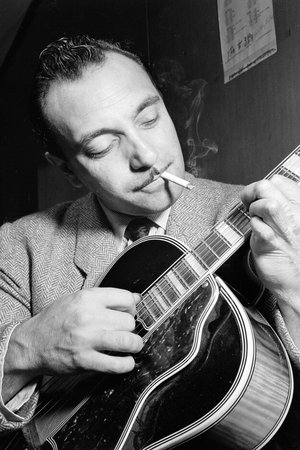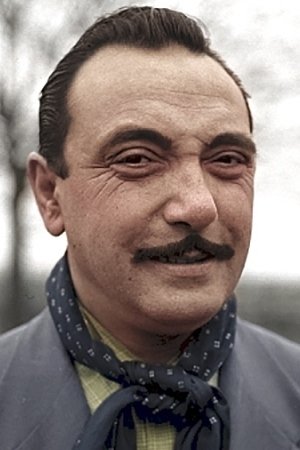Django Reinhardt (1910-1953)
Alias:
Jean Reinhardt
Birthplace:
Liberchies, Wallonia, Belgium
Born:
January 23, 1910
Died:
May 16, 1953
Jean Reinhardt (23 January 1910 – 16 May 1953), known to all by his Romani nickname Django, was a Belgian-born Romani-French jazz guitarist and composer. He was one of the first major jazz talents to emerge in Europe and has been hailed as one of its most significant exponents. With violinist Stéphane Grappelli, Reinhardt formed the Paris-based Quintette du Hot Club de France in 1934. The group was among the first to play jazz that featured the guitar as a lead instrument. Reinhardt recorded in France with many visiting American musicians, including Coleman Hawkins and Benny Carter, and briefly toured the United States with Duke Ellington's orchestra in 1946. He died suddenly of a stroke in 1953 at the age of 43. Reinhardt's most popular compositions have become standards within gypsy jazz, including "Minor Swing", "Daphne", "Belleville", "Djangology", "Swing '42", and "Nuages". Jazz guitarist Frank Vignola claims that nearly every major popular-music guitarist in the world has been influenced by Reinhardt. Over the last few decades, annual Django festivals have been held throughout Europe and the U.S., and a biography has been written about his life. In February 2017, the Berlin International Film Festival held the world premiere of the French film Django. Reinhardt was born on 23 January 1910 in Liberchies, Pont-à-Celles, Belgium, into a Belgian family of Manouche Romani descent. His father, Jean Eugene Weiss, domiciled in Paris with his wife, went by Jean-Baptiste Reinhardt, his wife's surname, to avoid French military conscription. His mother, Laurence Reinhardt, was a dancer. The birth certificate refers to "Jean Reinhart, son of Jean Baptiste Reinhart, artist, and Laurence Reinhart, housewife, domiciled in Paris". A number of authors have repeated the claim that Reinhardt's nickname, Django, is Romani for "I awake"; however, it may also simply have been a diminutive, or local Walloon version, of "Jean". Reinhardt spent most of his youth in Romani encampments close to Paris, where he started playing the violin, banjo and guitar. He became adept at stealing chickens. His father reportedly played music in a family band comprising himself and seven brothers; a surviving photograph shows this band including his father on piano. Reinhardt was attracted to music at an early age, first playing the violin. At the age of 12 he received a banjo-guitar as a gift. He quickly learned to play, mimicking the fingerings of musicians he watched, who would have included local virtuoso players of the day such as Jean "Poulette" Castro and Auguste "Gusti" Malha, as well as from his uncle Guiligou, who played violin, banjo and guitar. Reinhardt was able to make a living playing music by the time he was 15, busking in cafés, often with his brother Joseph. At this time, he had not started playing jazz, although he had probably heard and had been intrigued by the version of jazz played by American expatriate bands like Billy Arnold's. He received little formal education and acquired the rudiments of literacy only in adult life. ... Source: Article "Django Reinhardt" from Wikipedia in English, licensed under CC-BY-SA 3.0.






